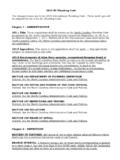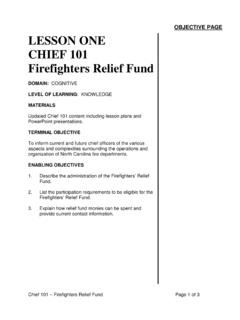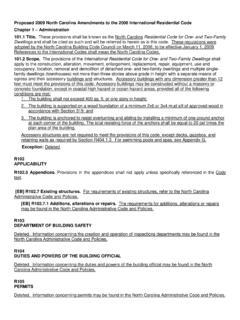Transcription of A CONSUMER’S GUIDE TO ANNUITIES - NCDOI
1 A consumer S GUIDE TOANNUITIESThe North Carolina Department of Insurance makes this GUIDE available to help North Carolina residents better understand ANNUITIES , and make smart decisions when shopping for ANNUITIES . An annuity is an insurance contract. It requires the insurance company to make specified payments to you at regular intervals, for a specified period of time. There are many different types of annuity contracts and a variety of annuity options available, to help solve various financial problems and needs. For example, deferred ANNUITIES are ideally suited to help individuals accumulate money for future income needs, and a life annuity is a payout option that guarantees specified payments will continue for as long as you live. I believe you will find this GUIDE to be informative and helpful. Your Department of Insurance is available to help GUIDE you through these complicated matters.
2 I want every North Carolinian to know that help is available by calling our toll-free number Causey Insurance CommissionerACCUMULATION PERIODThe time during which you pay money into an annuity contract and build up a fund to provide a deferred person entitled to receive annuity payments or who now receives method of receiving annuity benefits through a series of income payments for life or some other defined periodAPPEALAn insurance company s review of its own non-certification decision, after you dispute that decision. This process is available any time a plan issues a non-certification decision. The appeal process is voluntary. Keep in mind that if your insurance company denies payment on a claim because the service is excluded from coverage, you do not have the right to appeal. Your certificate of coverage should clearly list what services are covered and not covered.
3 INDIVIDUAL RETIREMENT ACCOUNT (IRA)An account set up by an individual that in some cases allows contributions to be deducted from income and permits earnings on contributions to accumulate tax-deferred until retirement, regardless of whether the contributions are deductible. Under the 1986 tax law, only those who do not participate in a pension plan at work or who do participate and meet certain income guidelines can make tax-deductible contributions to an IRA. All others can make contributions to an IRA on a non-deductible sales fees or charges you pay in purchasing an annuity PERIODThe period during which you receive the income from your annuity amount you pay into your annuity contract as distinguished from the interest that is credited to cancellation of a policy for its cash CHARGESC ontractual charges imposed by an insurance company in the event of early policy OF TERMS1An annuity is an insurance contract designed to provide an individual with income for an established period of time, often beginning at retirement age.
4 Payments are generally made on a monthly basis and may continue for as long as you live or for a stated period of time. Payments may begin immediately, or be deferred until some future date. Most ANNUITIES are long term contracts and generally should not be considered or purchased for short-term may be appealing and useful in a variety of situations. The following are some examples: Companies funding their employees pension plans; Individuals who are not covered under traditional pension plans or who desire to supplement their future incomes; Individuals who have sold a business; Individuals who have sold a home; A widow, widower or divorcee who needs to convert a lump sum cash settlement into income, but wants safety and security in terms of future payments and guarantees; Grandparents who want to provide for their grandchildren; or Someone who desires to set aside or accumulate funds for future OR DEFERREDI mmediate ANNUITIES begin providing periodic benefit payments immediately after they are purchased.
5 They are particularly attractive to people who retire and wish to convert savings and/or investment accounts into a guaranteed stream of income payments. Deferred ANNUITIES provide an initial period of time (following the purchase date) to fund the contract, before payouts begin. This is known as the accumulation period. Premiums paid and interest earned during the accumulation period are credited by the insurer to the policy s accumulation fund, and a minimum guaranteed interest rate is usually provided by the insurer during this period. Under a deferred annuity, the annuitant simply defers the beginning of payouts ( annuitization ) until some future date. QUALIFIED OR NON-QUALIFIED Federal law determines whether an annuity is considered qualified or non-qualified. Premiums paid into a qualified annuity are tax deductible (paid with pre-tax dollars).
6 Taxes on those premiums, and on growth accumulated within the annuity, are deferred until funds are paid into a non-qualified annuity are not tax deductible. Taxes are deferred only on growth accumulated within the PREMIUM OR INSTALLMENT PREMIUMA nnuity contracts may be either single premium or installment premium. Single premium contracts require you to fully fund the annuity contract in one single premium payment. Installment premium contracts allow an annuity to be funded by means of premium payments over a period of time. Most often, installment premium ANNUITIES are also flexible premium contracts that allow you to pay as much as you desire whenever you choose, within specified IS AN ANNUITY? |||||||||||||||||||||||||||||||||||||||| |||||||||||||||||||||||||||||||||||||||| TYPES OF ANNUITIES |||||||||||||||||||||||||||||||||||||||| |||||||||||||||||||||||||||||||||||||||| |||2 FIXED OR VARIABLEA fixed annuity provides fixed-dollar income payments backed by the guarantees in the contract.
7 For example, the company may guarantee that the interest rate on the funds accumulating in the policy will be at least three percent. Guarantees are based on conservative assumptions, so that the company will be able to fulfill its promises and obligations regardless of economic conditions. In many instances, actual interest crediting rates may be greater than minimum guarantees; however, if you are shown any illustrations of how an annuity might grow in the future, you should keep in mind that the actual results may turn out to be better or worse than those shown in the annuity is classified as a variable if its value (during either the accumulation period or the payout period) is based directly on the performance of securities. In a variable annuity, funds are invested in securities such as stocks and unsecured bonds, which tend to fluctuate with economic conditions.
8 As a result, the value of a variable annuity depends upon the value of those underlying securities. You, the owner or annuitant, bear the investment risk as the value of the annuity rises and falls with the investment performance of the underlying securities. Within a variable annuity, invested funds are held in the annuity s separate account. If you are thinking about buying a variable annuity, you should be especially careful in making sure that it suits your needs and risk tolerance. The North Carolina Department of Insurance and the Securities and Exchange Commission regulate companies authorized to sell variable ANNUITIES in North Carolina. Licensed life insurance agents, banks and brokerage houses that sell variable ANNUITIES must also hold a securities INDEXED ANNUITIES (see appendix for additional information)The accumulation value of the annuity is based upon the increase or decrease of a specified index (such as a stock index).
9 The calculations used to determine this value may differ for each product. The policy will usually specify a guaranteed minimum interest rate for fund , an annuitant has a great deal of flexibility in deciding when to annuitize the policy and begin receiving annuity benefit LIFE OR PURE ANNUITY Under a straight life annuity option, you receive a guaranteed income for as long as you live. However, there are no further benefits paid to anyone after you (the annuitant) die. This type of annuity contract is sometimes called a pure annuity. This type of annuity provides the maximum amount of periodic benefit payment to a sole annuitant compared to the premiums paid. It is generally recommended for someone who wants to maximize the size of annuity payouts, and who either has no dependents or has provided for dependents through other CERTAIN ANNUITY With this option, the company guarantees benefit payments for a specified number of years regardless of whether you die prior to the end of the benefit period.
10 The guaranteed period is often called the period certain and is frequently 10 or 20 years. If you die before the end of the specified period, the company will pay the remainder of the benefits to your designated beneficiary or OPTIONS |||||||||||||||||||||||||||||||||||||||| |||||||||||||||||||||||||||||||||||3 How much you pay for an annuity depends on how much monthly income you desire, your age when you buy the annuity contract and the time when you want to start receiving benefits. It also depends on how you wish to make your payments ( : in a single sum or in a series of payments). For a single-premium deferred annuity, the smallest amount of purchase payment a company will accept may be $2,500 or more. For a flexible premium retirement annuity, the company may accept payments of less than $100, although more may be required during the first year. You should compare annuity contracts offered by different companies since sales charges, surrender charges, interest rates and benefit payments can vary.
















